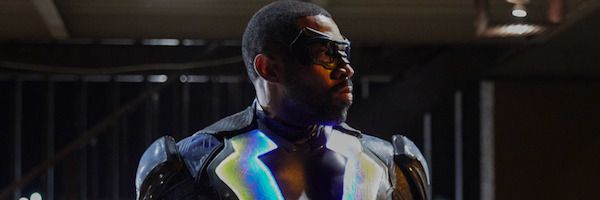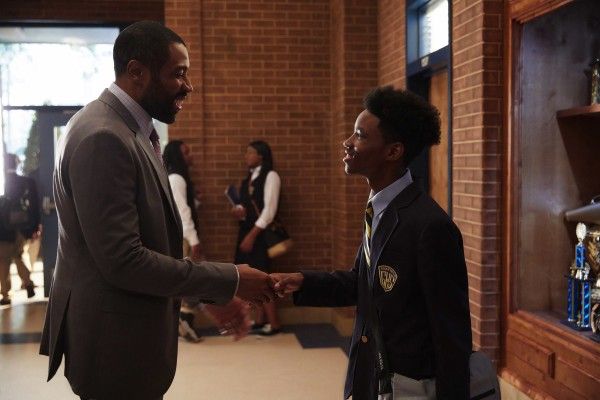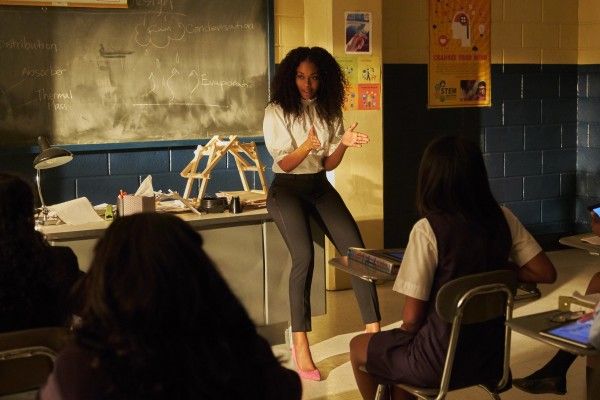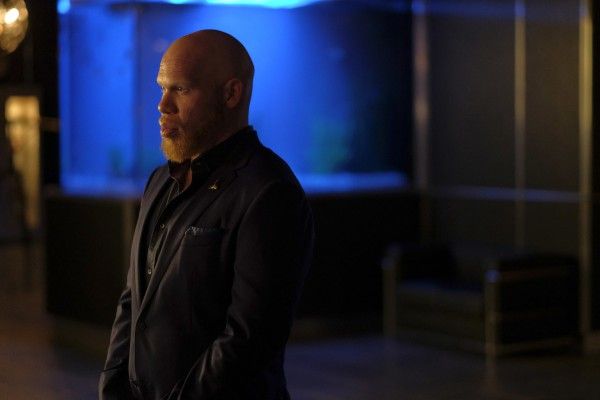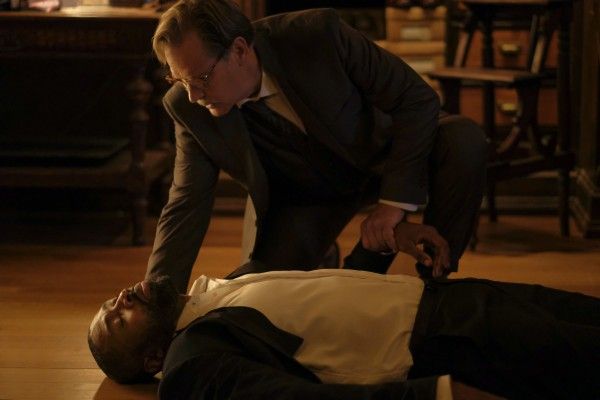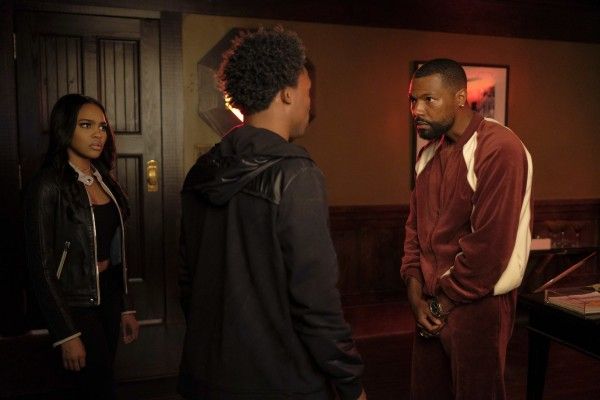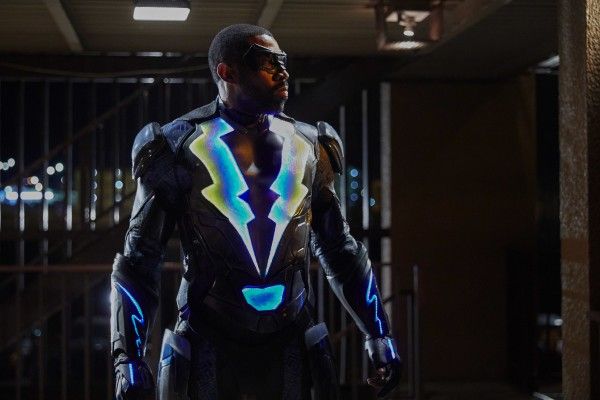Nothing about Black Lightning feels familiar. That's a good thing. It’s on The CW, but it doesn’t look like any other CW show (and not only because it’s the network’s first series with a black lead). It’s a superhero show, but it puts characters first and the super-powered stuff second. It’s not an origin story about a 20-something getting powers, either; it’s about rebirth for a man old enough to be their father.
Black Lightning focuses on Jefferson Pierce (the extremely charismatic Cress Williams), a retired vigilante. The balance between being a superhero and caring for his family was one his wife Lynn (Christine Adams) was unable to live with; Jefferson would come home beaten, bruised, and bloodied, and there was always a chance he wouldn’t come back at all. It was too hard to continue that way, so she didn’t. The family split up, and Jefferson hung up the cape (as it were). He became a high school principal, convincing himself that he was changing more lives in his community that way than he would as Black Lightning.
The series, developed by Mara Brock Akil and Salim Akil, presents Jefferson’s story as just one part of a very complicated whole. The pilot starts with Jefferson’s older daughter Anissa (Nafessa Williams), a medical student who also teaches at the school, being arrested after participating in a protest that turned violent. Jefferson is then pulled over by police (for the third time that month, he says) on the way to a school fundraiser after being profiled as a potential robber. But as he challenges them, “I’m sure the description was of a black man dressed in a suit and tie, with a getaway car that’s a midsize Volvo wagon?” It’s not the only time Jefferson is wrongfully detained by police, and in that first instance both of his daughters immediately pull out their cell phones and start recording. Jefferson’s eyes sizzle with electricity during the incident, but he represses the urge to give in to his powers or to fight back. Instead, he just says “don’t shoot.”
Black Lightning is a very savvy show, and one that deals with a number of complex themes. It introduces us immediately to a fully-formed world in Freeland, where exposition is revealed naturally, and the characters genuinely feel like they’ve known each other for years. There’s also an intimacy to Black Lighting that can be warm, like with Jefferson’s family, or extremely cold, like in close-up, violent executions by gang members. The series is not interested in having Jefferson or anyone else take out legions of faceless bad guys. There is a lot of gun violence, but it has a point; while life on the streets of Freeland may be cheap, death means something on Black Lightning.
Most of the episodes available for review deal with Jefferson’s struggle to help his community in the face of uncontrollable violence. The police are overwhelmed, but one detective, Henderson (Damon Gupton), is a friend of Jefferson’s and dedicated to good police work. The series is full of people who believe they are doing what is right for their community, from Jefferson and Henderson to even a drug dealer name Lala, as he schools a young boy to be polite and shake hands, while also roughly reminding him that while he wastes time on his cell phone, “the white boys you should be selling to are being groomed to run the world." And yet his actions are completely opposed to Jefferson’s, a man he respects in private but ridicules among his cronies. The dynamics are complicated.
It's all summed up, in a way, by the show's theme song, which is short and to the point: "I saw a superhero / he was black / he said this is for the street / Black Lightning's back."
Race is absolutely front and center in Black Lightning, and the politics of it are never murkier than in the mysterious figure of Tobias Whale (Marvin “Krondon” Jones III), the leader of The 100 gang. Tobias and Jefferson have a long and difficult history, but what is most interesting to note in these early episodes is Tobias — an albino black man — is flanked and aided by white henchmen. “Damn boss, you really hate black people,” Lala says to him in Tobias’ ornate lair. “I love black people,” Tobias replies. “But y’all keep us acting like newly freed slaves.”
When Luke Cage premiered on Netflix, it was an opportunity to give us a story we haven’t seen before: a black superhero in a TV world awash with white ones. And for a few episodes, it did what was promised. But ultimately, it didn’t deliver. The show fell prey to the same issues as Marvel’s other Netflix series. It was too long, too slow, and the focus was all about one character not wanting to be a hero.
Now it's DC's turn. Since I’ve only seen two episodes of Black Lightning, it’s impossible to say whether or not the show will continue with the quality it’s shown in its first hours. But it is immensely promising, and perhaps finally delivering on the hope that Luke Cage first provided. Mara Brock Akil and Salim Akil’s scripts are sharp and clear, and the production has style. This is a show that knows what it wants to say, and how it wants to say it. From the music to the direction, to the smart use of everyday tech and the thoughtful set dressing and costuming (I could go on for days about the cozy shop owned by a tailor, Gambi — played by James Remar — Jefferson’s oldest friend and surrogate father), all of it is indicative of a show confident in what it wants to be.
Black Lightning also balances those politics with super-heroics and its family-centric story, doing so with exceptional precision. There is, crucially, a healthy dose of humor as well, and an easy rapport among the characters. Things move fast on the show — that’s typical for The CW — and Jefferson will not fight the reigniting of his powers forever (something that his ex-wife calls an “addiction”). The series is also in no hurry to focus on that. Wisely, it makes the powers an afterthought to the rest of the drama happening.
Chief among that drama is the fact that Jefferson’s younger daughter Jennifer (China Anne McClain) is the one whose rebellion improbably kicks off the eventual return of Black Lightning. Her desire to get close to a member of The 100 gang starts a ball rolling that has immediate consequences (there is so much story in these first two hours, and it's all good). But while Jennifer and Anissa do end up needing their father to save them (though they don’t yet know that it is him), they are strong and capable on their own, with the possibility of developing their own powers. Like any good superhero story, there is a sense of destiny with the Pierce family. “I’m not trying to save this city, I’m trying to protect my family,” Jefferson says to Gambi. Those desires may not be opposed for long. When Jefferson is in Black Lightning mode, he’s both engaging in electric hand-to-hand combat and reigniting a hope in the people of Freeland. When greeted by a doorman on his way to hunt a notorious gang member, the man says excitedly, “Black Lightning, my man!” It’s positive, it’s victorious, it’s complicated, and it’s badass.
Rating: ★★★★★ - An exceptional start
Black Lightning premieres Tuesday, January 16th on The CW, and also stay tuned for our weekly recaps.

